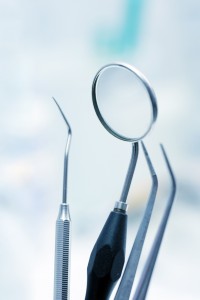Best Time in History to See The Dentist
September 15, 2014
 Many Americans have fears associated with going to the dentist to some degree. Some of those fears are caused by bad experiences from our childhoods, hearing about the bad experiences of others, or perhaps just a dislike of the idea of dental work in general.
Many Americans have fears associated with going to the dentist to some degree. Some of those fears are caused by bad experiences from our childhoods, hearing about the bad experiences of others, or perhaps just a dislike of the idea of dental work in general.
But when it comes to the health of your teeth and the availability of quality dental care, there is no better time than the present to visit Dr. Banda at Cranbrook Dental Care in metro Detroit, MI. Ever wonder what people did to treat tooth pain and decay before the advancements in modern dentistry we enjoy today?
Interesting Facts about Dental History
The origins of modern dentistry can be traced all the way back to the Romans and Egyptians. However, the causes of both tooth pain and decay were not known back then. Nor was the importance of oral hygiene and maintenance. Without this basic understanding, the ancients attributed dental problems to demons and evil spirits. Many even believed that holes in teeth were caused by tooth worms.
Our ancestors were just as creative in seeking remedies to tooth problems, including using arsenic and fumigants. The Romans were fond of using urine (for the ammonia) to clean their teeth, while the Egyptians used opium to treat pain. There were also advocates for using wine and vinegar as mouthwash, or brushing your teeth using the twig of a fig tree and a honey and oil paste.
While there is evidence of crude dental tools as early as 7000 B.C, the first record of modern dental procedures didn’t emerge until the middle ages. Some books from this period have written instructions on tooth extraction. Back then, dental procedures were performed by barbers. The same barbers that shaved beards and trimmed hair would also perform surgical procedures such as bleeding, cupping, leeching, and extracting teeth.
Modern Dentistry
It wasn’t until the early 18th century that modern dentistry began to take shape. In 1723 Pierre Fauchard, a French surgeon, published The Surgeon Dentist, A Treatise on Teeth. In the 1800’s the first dental chair, porcelain teeth, orthodontics, ether anesthesia and dental college emerged.
In 1938, the modern toothbrush was invented. In 1950, fluoride toothpaste came to market. The 1980’s brought about the use of dental implants and home teeth whitening. Cosmetic dentistry has only become popular in the last 20 years.
A brief look into our history will show that we are very lucky to be living in the modern era of dentistry. Unlike our forefathers, we have immediate access to hygienic, pain free dental care. You can rest assured that this is the best time, in history, to see your dentist and be proactive about your overall oral health. Take advantage of this access and contact Dr. Banda at Cranbrook Dental Care today to set up your next appointment. We serve everyone throughout metro Detroit including, Troy, Bloomfield Hills, Clarkston, Royal Oaks and Birmingham.
Pediatric Sealants and Fluoride
July 2, 2014
 Until your child learns how to brush efficiently, he or she may be more prone to developing cavities. Thankfully, there are preventive services that can help young patients protect their teeth. And at Dr. Banda’s office in Bloomfield Hills, we’re happy to offer them at regular checkups and dental cleanings.
Until your child learns how to brush efficiently, he or she may be more prone to developing cavities. Thankfully, there are preventive services that can help young patients protect their teeth. And at Dr. Banda’s office in Bloomfield Hills, we’re happy to offer them at regular checkups and dental cleanings.
The specific services we’re talking about are dental sealants and fluoride treatments. And in today’s post, we want to talk briefly about what each one involves and how it helps.
Dental Sealants
Dental sealants protect the chewing surfaces of teeth, especially where there are deep pits or grooves where bacteria and food particles can hide. Sealants are applied as a liquid and then dried until they form a thin plastic layer directly protecting teeth from food or decay-causing bacteria. The entire process only takes about 10 to 45 minutes, depending on how many teeth we’ll be sealing. Once complete, results can last for as long as 10 years.
Fluoride Treatments
Fluoride helps teeth by attracting the minerals that strength tooth enamel. A fluoride treatment at our Bloomfield Hills office requires just one quick rinse. In addition to receiving fluoride treatments from us, make sure that your little one is also brushing with a fluoride toothpaste. What’s more, most water supplies in the US contain fluoride. Adding a fluoride mouthwash to your child’s regular brushing and flossing routine will also help your little one enjoy good oral health.
Do you have questions about these services, or do you need to schedule an appointment with Dr. Banda? Call us today. We serve patients from Clarkston, Troy, Royal Oak, Birmingham, and the entire metropolitan Detroit area.
Treating Bruxism with Customized Nightguards
June 19, 2014
 If you’ve never heard of bruxism, your immediate question might be, “What is bruxism?” In today’s post, we want to talk about what exactly this condition is, what causes it, and how Dr. Banda of Cranbrook Dental Care can help you treat it.
If you’ve never heard of bruxism, your immediate question might be, “What is bruxism?” In today’s post, we want to talk about what exactly this condition is, what causes it, and how Dr. Banda of Cranbrook Dental Care can help you treat it.
What Is Bruxism and What Causes It?
To put it simply, bruxism is a term that describes a recurring and unconscious struggle with teeth grinding. For many patients with bruxism, it’s caused by stress. What’s more, patients have the most trouble with it while sleeping, when it’s impossible to consciously stop grinding.
Symptoms of bruxism include headaches, earaches, and jaw pain. Other causes of bruxism, besides stress, include misaligned teeth, or a poor posture, poor diet, or poor sleep habits. Patients with bruxism may also display other kinds of biting habits. They may bite their fingernails, for instance, or they might bite the ends of pencils, their lips, or the insides of their cheeks. The condition affects roughly one-third of the population, and it’s more prevalent in women than men.
Over time, the constant pressure and motion associated with bruxism can seriously damage teeth. Bruxism can also contribute to TMJ dysfunction, which has many symptoms in common.
Customized Care for Teeth Grinding
Thankfully, treatment for teeth grinding is possible with a custom-made nightguard from Dr. Banda’s Bloomfield Hills dental office. During a consultation, we’ll evaluate your teeth, tissues, and muscles. Once we know what your needs are, Dr. Banda can help you understand how a nightguard will help you. We can also talk to you about other treatment techniques.
Do need help treating bruxism? Call Cranbrook Dental Care today for an appointment with Dr. Banda. We serve patients from Clarkston, Troy, Royal Oak, Birmingham, and the entire metropolitan Detroit area.
Are Your Brushing Correctly?
May 23, 2014
 Brushing and flossing are two of the most important daily activities you can do. With regular brushing and flossing, you can remove bacteria and plaque from your teeth and your gumline, protecting it from common oral health issues like tooth decay and gum disease. What’s more, because studies have linked gum disease with health problems in other parts of the body, caring for your smile is another way of caring for your overall health.
Brushing and flossing are two of the most important daily activities you can do. With regular brushing and flossing, you can remove bacteria and plaque from your teeth and your gumline, protecting it from common oral health issues like tooth decay and gum disease. What’s more, because studies have linked gum disease with health problems in other parts of the body, caring for your smile is another way of caring for your overall health.
So, now that you know how important brushing and flossing are, ask yourself: Are you brushing and flossing correctly?
To give your smile the help it needs, you should brush for about 120 seconds, or two minutes. You should also be sure that you’re dividing your time equally between not only your upper and lower teeth but also the inner surfaces and outer surfaces of your teeth. Hold your brush at about a 45 degree angle and apply gentle pressure as your scrub. To prevent bad breath, gently brush the surface of your tongue.
As for frequency, we recommend brushing at least twice a day, but it’s even better if you can do it after every meal. You should also floss at least once a day to get any leftover pieces of food away from your smile. And for extra protection from gum disease and tooth decay, we recommend using either an antibacterial or fluoride mouthwash.
Do you still have questions about how to brush and floss correctly? Don’t hesitate to call Dr. Banda’s office in Bloomfield Hills with your questions or to schedule an appointment. We serve patients from Clarkston, Troy, Royal Oak, Birmingham, and the entire metropolitan Detroit area.
Treating Sleep Apnea and Snoring with an Oral Appliance
April 24, 2014
 When you don’t get enough sleep at night, you can feel tired, stressed out, and moody the next day. If you feel this way often enough, you may see declines in your overall health and wellbeing.
When you don’t get enough sleep at night, you can feel tired, stressed out, and moody the next day. If you feel this way often enough, you may see declines in your overall health and wellbeing.
For some, there’s an easy fix to these symptoms. Maybe you just need to go bed earlier and at a more consistent time each night. In other cases, though, the fix may involve the diagnosis and treatment of a common but under-diagnosed condition known as sleep apnea.
Patients who struggle with sleep apnea stop breathing for 10 seconds or more throughout the night. As a result, the brain to send out a signal waking the patient up to take a breath.
Not every patient wakes up completely, though, which is why some patients don’t even know they are struggling with it. If you haven’t been diagnosed with sleep apnea but think you’re struggling with it, here’s a symptom to watch out for: snoring.
Often, the cause of a patient’s snoring and the cause of a patient’s sleep apnea go back to the same thing: obstruction from the tongue or lower jaw. Thankfully, there’s treatment for both at Dr. Banda’s office in Bloomfield Hills. A custom-made oral appliance from Cranbrook Dental Care will reposition your tongue and lower jaw while you sleep so that air passes through without anything stopping it. As a result, you can sleep better at night, and without snoring.
Are you worried that you might be struggling with sleep apnea? Call Cranbrook Dental Care in Bloomfield Hills to find out how Dr. Banda can help. We’re happy to offer care for sleep apnea and snoring to patients from Clarkston, Troy, Royal Oak, Birmingham, and the entire metropolitan Detroit area.
Athletic Mouthguards for Bloomfield Hills and Beyond
March 28, 2014
 Are you an athlete? Regardless of whether your play a contact sport or you enjoy something more solitary, you can benefit from wearing an athletic mouthguard. It’s been estimated that between 13 to 39 percent of all dental injuries have some connection to athletics.
Are you an athlete? Regardless of whether your play a contact sport or you enjoy something more solitary, you can benefit from wearing an athletic mouthguard. It’s been estimated that between 13 to 39 percent of all dental injuries have some connection to athletics.
You can prevent sports-related dental injuries by wearing an athletic mouthguard. That’s because quality mouthgaurds protect more than just your teeth. They also protect the tongue, lips, face, and jaw, and can even reduce the severity of concussion.
But not all athletic mouthguards are made equal. There are three different types.
Ready-made mouthguards are inexpensive and can be easily found in sporting goods stores. But while they provide some amount of protection, they aren’t customized. As a result, they can fit awkwardly and make breathing and speaking difficult.
Mouth-formed mouthguard provide more customized results. Also known as boil-and-bite mouthguards, this type conforms to your smile after being softened in hot water. But some feel that mouth-formed mouthguards have a bad taste. They can also lose their flexibility over time.
The best type of athletic mouthguard is one that’s been custom-made just for you. At Dr. Banda’s office in Bloomfield Hills, we can take impressions of your teeth and have a mouthguard made from them. With a custom-made mouthguard, you can play with more confidence and without worrying about your smile.
Do you want a custom-made athletic mouthguard? Call Cranbrook Dental Care for an appointment with Dr. Banda. We serve patients from Bloomfield Hills, Clarkston, Troy, Birmingham, Royal Oak, and beyond.
Protect Yourself from the Hidden Dangers of Periodontal Disease with Dr. Banda
January 29, 2014
 When you think about periodontal disease, what’s the first thing that comes to mind? Perhaps the thought of gum disease evokes images of receding gums or bleeding when you brush your teeth, or even eventual tooth loss if the condition progresses. Did you know, though, that untreated periodontal disease can actually affect your health in other ways? At Cranbrook Dental Care in Bloomfield Hills, MI, Dr. David Banda and his team provide comprehensive periodontal therapy to patients with gum disease to stop the condition in its tracks.
When you think about periodontal disease, what’s the first thing that comes to mind? Perhaps the thought of gum disease evokes images of receding gums or bleeding when you brush your teeth, or even eventual tooth loss if the condition progresses. Did you know, though, that untreated periodontal disease can actually affect your health in other ways? At Cranbrook Dental Care in Bloomfield Hills, MI, Dr. David Banda and his team provide comprehensive periodontal therapy to patients with gum disease to stop the condition in its tracks.
Periodontal Disease: The Systemic Link
In addition to contributing to major oral health problems, periodontal disease has been linked to a number of other, potentially more serious, complications. When the bacteria that accumulates in your mouth as a result of gum disease leaches into the blood stream, it can spread to organs and tissues throughout the body. Though research continues to delve into this systemic connection, the following have already been found to be consequences of untreated periodontal disease:
- Increased risk of coronary artery disease, heart attack and stroke
- Pulmonary hypertension
- Preterm birth and low birth weight infants
- High blood pressure
- Higher risk of pancreatic cancer
- Gastrointestinal disorders
- Rheumatoid arthritis
For the majority of patients, prompt periodontal therapy can substantially reduce the risk of developing these and other serious health problems.
Healthy Mouth, Healthy Body
If you’ve noticed the common symptoms of periodontal disease – bleeding gums, sensitivity, gum recession or chronic bad breath – it’s important that you address the problem before it becomes worse. Contact our office in Bloomfield Hills, MI today and schedule your consultation with Dr. Banda. We also gladly serve patients in Clarkston, Troy, Birmingham, Royal Oak and surrounding communities within the entire Detroit area. We look forward to helping you achieve optimal oral health and overall wellness!
Have You Thought of Any Smile Goals for 2014?
December 31, 2013
 A brand new year is just hours away. If you’re like most people, you might already have some goals mapped out for 2014. Maybe you want to eat better, or you want to improve your financial situation. But what about your smile? Have you considered what kind of goals you might have for it?
A brand new year is just hours away. If you’re like most people, you might already have some goals mapped out for 2014. Maybe you want to eat better, or you want to improve your financial situation. But what about your smile? Have you considered what kind of goals you might have for it?
Thinking ahead like this can be beneficial, especially if you’re on a limited budget or you know you’re in for a busy year. Working with Dr. Banda of Cranbrook Dental Care, you’ll be able to see the upcoming year with greater clarity. Not only can you make better plans, but you can face the year with a better sense of confidence.
For many patients, the primary goal will be a more attractive smile. This can be achieved with any of our cosmetic dental services, which include:
- Porcelain Veneers
- Invisalign
- Teeth Whitening
- Teeth Whitening
- Smile Makeovers
For other patients, restorative dental care might be the primary focus. With a selection of services that includes fillings, crowns, root canals and dentures, we’re confident we can improve not just the appearance of your smile but it’s functionality as well.
Still other patients will want to make regular visits a priority. We recommend that our patients from Bloomfield Hills and beyond come to see Dr. Banda twice a year for a regular exam and dental cleaning. Seeing Dr. Banda at least twice in a 12-month period will allow him to look for common conditions, like tooth decay and gum disease. Treatment for any condition should be administered as soon as possible—a goal that regular care makes possible.
Are you ready to schedule your first 2014 appointment with Dr. Banda? Call us to set up an appointment. We serve patients from Bloomfield Hills, Troy, Clarkston, Royal Oak, Birmingham, and the entire metropolitan Detroit area.
Important General Dentistry Services from Cranbrook Dental Care
November 12, 2012
 Your smile and your overall wellbeing are closely connected. Just think about the effect a toothache or sore gums can have on your mood. Poor oral health can also make it more difficult to eat certain foods. What’s more, when you feel bad about your teeth, your willingness to smile around others suffers. All of which explains why Dr. Banda of Cranbrook Dental Care offers such a wide range of general dentistry services.
Your smile and your overall wellbeing are closely connected. Just think about the effect a toothache or sore gums can have on your mood. Poor oral health can also make it more difficult to eat certain foods. What’s more, when you feel bad about your teeth, your willingness to smile around others suffers. All of which explains why Dr. Banda of Cranbrook Dental Care offers such a wide range of general dentistry services.
Our Bloomfield dental team believes that all of our patients, regardless of age, should come in every six months for a regular checkup and cleaning. Why so often? Because regular visit will help Dr. Banda monitor your smile for changes, like the appearance of decay or the early warning signs of gum disease.
Catching conditions like these early on is important. By catching them early, we can provide treatment before they’ve reached a developed stage. That means treatment will be more comfortable and less invasive. Our other general dentistry services include:
- Athletic mouthguards
- Snoreguards/sleep apnea
- Nightguards for bruxism
- Pediatric sealants
- Fluoride
- Periodontal disease
- TMJ therapy
To learn more about each of these services, click on the links above. And if you have any questions about what we offer, or if you’d like to reserve an appointment, don’t hesitate to give us a call. Dr. Banda and his team at Cranbrook Dental Care are proud to serve patients from Bloomfield, Troy, Birmingham, Clarkson, Royal Oak, and the surrounding metropolitan Detroit area.










